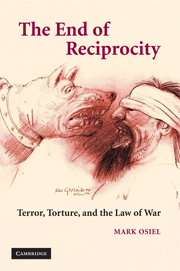Book contents
- Frontmatter
- Contents
- Introduction
- PART ONE RECIPROCITY IN HUMANITARIAN LAW
- PART TWO THE ETHICS OF TORTURE AS RECIPROCITY
- 4 Is Torture Uniquely Degrading? The Unpersuasive Answer of Liberal Jurisprudence
- 5 Fairness in Terrorist War (1): Rawlsian Reciprocity
- 6 Fairness in Terrorist War (2): Kantian Reciprocity
- 7 Humanitarian Law as Corrective Justice: Do Targeted Killing and Torture “Correct” for Terror?
- PART THREE RECIPROCITY IN THE SOCIAL SCIENCE OF WAR
- PART FOUR THE END OF RECIPROCITY
- Conclusion
- Acknowledgments
- Notes
- Index
5 - Fairness in Terrorist War (1): Rawlsian Reciprocity
Published online by Cambridge University Press: 05 June 2012
- Frontmatter
- Contents
- Introduction
- PART ONE RECIPROCITY IN HUMANITARIAN LAW
- PART TWO THE ETHICS OF TORTURE AS RECIPROCITY
- 4 Is Torture Uniquely Degrading? The Unpersuasive Answer of Liberal Jurisprudence
- 5 Fairness in Terrorist War (1): Rawlsian Reciprocity
- 6 Fairness in Terrorist War (2): Kantian Reciprocity
- 7 Humanitarian Law as Corrective Justice: Do Targeted Killing and Torture “Correct” for Terror?
- PART THREE RECIPROCITY IN THE SOCIAL SCIENCE OF WAR
- PART FOUR THE END OF RECIPROCITY
- Conclusion
- Acknowledgments
- Notes
- Index
Summary
Does the law of war provide rules that are fair for fighting terrorists? How would we go about devising such rules if we were to start from scratch, rather than merely tinkering with the intellectual legacy we have inherited from centuries of reflection on rather different kinds of armed conflict?
These large questions should be divided into parts. First, there is disagreement about whether humanitarian law is even much concerned with ensuring a fair fight. One prominent view holds that law's aspiration is more modest: merely to minimize superfluous suffering, in the language of the Geneva Conventions. Leading scholar/practitioner Michael Schmitt thus writes that “‘humanitarian law…is neither intended nor designed to ensure a ‘fair fight.’” Belligerent reprisals, in particular, “have never been justified on the basis that it is unfair for one side to be limited by humanitarian law when the other ignores it,” he contends.
Still, causing suffering that is unnecessary to a state's military triumph could surely be described as unfair to those – both civilian and soldier – personally experiencing it. The law of war is very much concerned with fairness in this sense. But more in question, perhaps, is whether humanitarian law is much dedicated to achieving fairness between antagonists. The notion of avoiding unfair advantage between such entities finds no textual expression in the Conventions themselves or their drafting history. Yet it is hard to imagine any other basis for it, and Schmitt cites no evidence or authority, historical or contemporary, for his conclusion.
- Type
- Chapter
- Information
- The End of ReciprocityTerror, Torture, and the Law of War, pp. 166 - 177Publisher: Cambridge University PressPrint publication year: 2009

